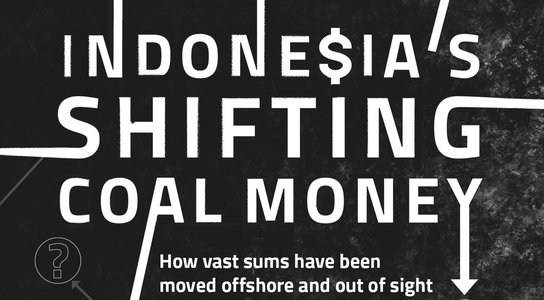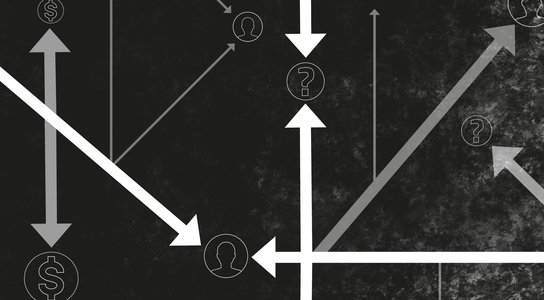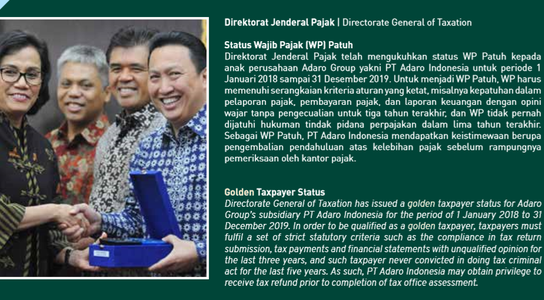Last month, we released our report Taxing Times For Adaro, highlighting serious concerns for investors in the Indonesian coal industry. Here’s what happened next…
On 4 July, Global Witness revealed that Indonesian energy group Adaro, one of the world’s largest coal businesses, had been moving vast amounts of profit to a growing network of companies based in tax havens. This network may have helped Adaro avoid or minimise the tax it pays in Indonesia, by up to 125 million US dollars.
This was the third report in our Indonesia’s Shifting Coal Money series. This chain of investigations reveals the widespread use of opaque corporate structures to shift millions of dollars from Indonesia’s coal industry to offshore companies.
The release of Taxing
Times For Adaro caused a considerable stir in Indonesia. It received huge media
coverage, from Tempo (the leading
weekly news magazine), the top online news platforms, and international media
like CNBC Indonesia. Thousands of Indonesian citizens were discussing the
report on social media. A
photograph we included in the report of the country’s Finance Minister, Sri
Mulyani, presenting Adaro executives with a ‘Golden Taxpayer’ award, spurred a debate about tax policy.
Our Indonesian
language ‘breaking news’ video was viewed 1.4 million times, making it the
most-viewed Global Witness video ever. (At least it was until this month - our
colleagues in the Environmental Defenders team beat this record with their
amazing video launching their new
report celebrating the people who risk their lives to defend our world.)
Adaro responded not to contradict our figures on how much profit had been moved to tax havens,
but to say that the Indonesian Tax Authority should be the judge, and that
Adaro complies with tax regulations. Meanwhile, the Director-General of the Tax
Authority said that he
would study our report.
Curiously, Adaro also wrote to the Indonesian Stock Exchange shortly after our
report was released to say it was reviewing its latest (at the time
unpublished) financial statements.
The Indonesian Anti-Corruption Commission, the KPK, widely respected In Indonesia for tackling high-profile figures in corruption cases, also reacted. According to reports, the KPK asked 51 coal companies to send them their coal sales records for the past two years. Our investigation helped contribute to this outcome, which reportedly will see the KPK checking these sales records for transfer mispricing or tax avoidance.
Previous reports in the Indonesia’s Shifting Coal Money series have shown that the tax haven activities of Indonesian coal companies can add financial risk to the already-obvious environmental impact of coal. It is now clear that the Indonesian coal industry is also becoming an acute reputational risk for those who do business with it. The Indonesian government and investors should urgently distance themselves from the industry.
Despite these controversies, Adaro is still building coal plants. HSBC, one of the UK’s biggest banks, has funded Adaro to the tune of US$270 million, and is helping Adaro build the new Tabalong coal plant in Indonesia. This is despite HSBC’s claims that they are supporting a transition to a low-carbon economy. The South Korean Government’s finance institutions, the Korea Development Bank and the Korea Trade Insurance Corporation, are also involved in Tabalong, as are two major Japanese banks, Mizuho and SMBC.
These institutions need to realise the escalating climate and reputational risks of investing in coal. They should join the growing number of institutions refusing to fund the coal industry. In February 2019, the Institute for Energy Economics and Financial Analysis (IEEFA) published research showing that global capital is ‘fleeing the coal sector at an alarming rate’, with over 100 global financial institutions already having ended finance to the coal industry. IEEFA demonstrated that on average every two weeks a new bank, insurer or lender announced new restrictions on coal finance.
The Adaro story isn't over yet. As our report is examined by the authorities in Indonesia, it’s time for lenders to end the flow of money into the Indonesian coal industry.


